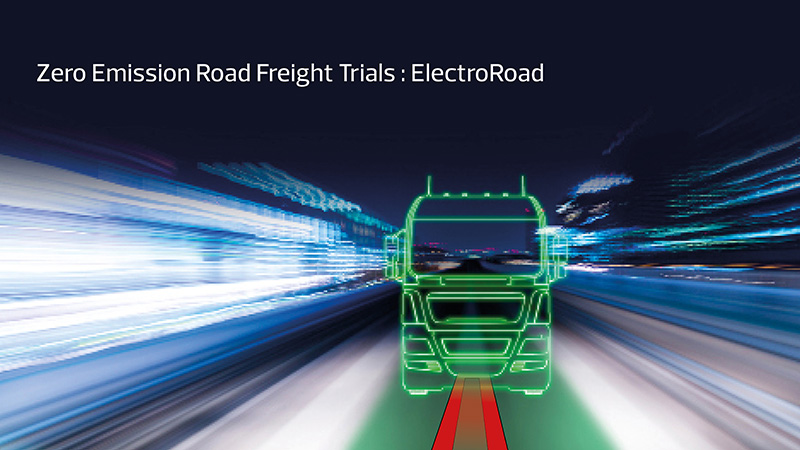ElectroRoad is part of the ZERFT programme, comprising 20 projects focussed on helping the UK solve challenges around zero emission road freight. Delivering the ElectroRoad project is a consortium comprised of Honda UK, Honda Japan, Galliford Try, TRL, Miralis Data, and Nova Modus.
ElectroRoad is an in-depth feasibility study of an extended, on-road UK demonstration of ERS technology for HGVs, that has been developed and proven on smaller vehicles over the last 10 years.
The challenge
Addressing the urgent need to reduce carbon emissions by electrifying road freight is challenging as adding heavy batteries does not increase range proportionately. Limiting range and payload, this applies especially to Heavy Goods Vehicles. This also causes problems with disposing or reprocessing of waste batteries – maybe 50M tons by 2045. Before this, global reserves of the materials used to make batteries are likely to be severely depleted too. Dynamic on-road charging has the potential to reduce the battery capacity needed to achieve a required range, by powering electric vehicles and charging the batteries simultaneously. These Electric Road Systems are of particular benefit to road freight applications.
The project scope
The ElectroRoad project is a comprehensive study of an innovative Electric Road System applied to 44t Heavy Goods Vehicles to be deployed in a long term demonstration of all-electric HGVs on UK roads. The approach is scalable, through fitting new 'glider' chassis with zero emission powertrains, batteries, and ERS hardware. The fleet size will consider the needs and capabilities of participating truck operators, as well as the learning and maintenance requirements for the infrastructure, hardware and vehicle suppliers.
The project will propose a 5 year demonstration of 44-tonne zero tailpipe emission trucks, operating over routes at least 30km in length. A number of potential UK demonstration locations will be assessed for possible deployment, operation and decommissioning of roadside dynamic charging rails and support infrastructure. This includes pre-deployment work such as selection of locations, planning and preliminary engineering designs, site surveys, electric grid connections and pre-authorisation as far as possible. In addition to dynamic charging, the demonstration will plan to include static charging systems at suitable freight operator depots and hubs.
In-depth engagement is vital to ensure our proposed demonstration meets the needs of key stakeholders Highways England and National Grid. We will also engage with other stakeholders including local highway authorities, DfT, emergency services, road users and local residents. Several freight operators are supporting with resources and expertise to ensure our proposed demonstration delivers a real-world zero emission road freight solution.
ElectroRoad will develop an end-to-end safety and regulatory framework, supported by detailed risk analyses with appropriate mitigations including training requirements. We will propose methodologies and tools for monitoring and evaluating the demonstration. Cost Benefit Analyses across all aspects, will provide full costing for the demonstration: vehicles, road and charging infrastructure, power distribution and management, both installation and decommissioning. These will also be used to detail the economic viability of the system, from the perspective of all stakeholders, and for developing the UK supply chains required.
TRL's contribution
Preparing for the demonstration, TRL will lead the development of an operational safety framework, and propose and end-to-end regulatory framework, for the use and demonstration of ERS for HGVs. TRL will also lead the formulation of a comprehensive risk analysis for an ERS demonstration at the suggested locations. All these activities will be underpinned by engagement with a wide range of stakeholders.
TRL has previous experience in on-fleet trials of new technology, in particular the Low Emission Freight Trials (LEFT), the Low Emission Bus Scheme (LEBS), and the HelmUK truck platooning trials. For ElectroRoad, TRL will be leading the work package to develop a suitable methodology for monitoring and evaluating a future demonstrator. Finally, it will be TRL's task to consolidate all project outputs into a final report, with recommendations.
The project is expected to take around 9 months and will deliver its report in the spring of 2022.
Acknowledgements
The ElectroRoad project receives funding from the Department for Transport through Innovate UK, with 43% of the project cost being met by investment from TRL’s industry partners in the consortium delivering the project.

